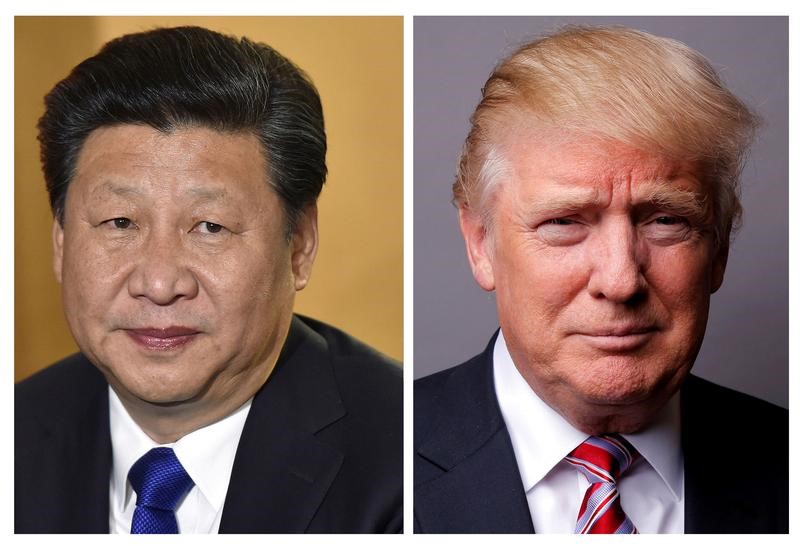(Bloomberg Opinion) -- Donald Trump believes he is about to score yet another big win on trade, this time with China. Progress in talks with Beijing, he claims, has been so “substantial” that he’s delayed a looming March 1 deadline and is likely headed for a summit with China’s President Xi Jinping to finalize a long-awaited settlement.
This latest “win,” however, is shaping up to be a typical Trump victory -- much, much more smoke than fire. And the potential consequences could be costly: long-term damage to U.S. credibility with China and, more broadly, within the entire global economic order.
So far, Trump’s negotiators appear to have made headway on large-scale Chinese purchases of American goods to narrow the trade deficit, some market-opening measures for U.S. companies, a pledge not to manipulate the yuan and perhaps better protection for U.S. intellectual property. The progress, though, has come in areas that either mean little to China, such as reducing the trade deficit, or are already in line with overall Chinese policy, as in improving intellectual property rights. The Chinese delegation so far appears to have deftly dodged concessions that would force fundamental changes in Beijing’s core policy agenda and state-led economic system. Of course, talks are still ongoing, so further breakthroughs are possible. But, as Trump seems more and more intent on sealing a deal, they’re increasingly unlikely.
That means the China trade agreement will in all likelihood follow an all-too-familiar pattern: Trump talks big but settles for little. Last year, he sold a revised free-trade agreement with South Korea as “brand new” when the changes were cosmetic. Beyond a couple meaningless tweaks on automobile trade, Trump managed to blackmail Seoul into imposing a quota on steel exports to the U.S. The revisions in the replacement for the North American Free Trade Agreement are more substantive, especially in automobile, dairy and digital trade. But the revised pact, the United States-Mexico-Canada Agreement, is hardly a game changer. As Claude Barfield, resident scholar at the American Enterprise Institute, has explained, there are “large sections of the old NAFTA which were not touched” in the update, and the new deal “won’t really be affecting trade flows.”
The petty way Trump dealt with allies South Korea, Canada and Mexico in trade negotiations was bad enough for Washington’s reputation. The fallout from the China deal could be much more severe. First off, Trump’s strategy of speaking loudly and carrying a small stick will only make it harder to negotiate with China in the future. His climbdown will reinforce the perception among Chinese leaders that they can outlast elected American politicians, no matter how combative they appear, who will eventually wither under short-term political pressures. That means the next time Washington complains about Chinese trade practices -- which is inevitable, given the likely incomplete nature of the current deal -- Beijing will be even more resistant to making major concessions.
More importantly, Trump is, in certain respects, prodding Chinese economic policy in the exact wrong direction. Clearly, those big purchases of U.S. agricultural produce, energy and other products pledged by Beijing can happen only if organized by the Chinese state. That puts Washington in the awkward position of demanding Chinese bureaucrats overrule markets and twist trade flows on behalf of the U.S.
What American companies really want is to get the Chinese state out of the way -- to allow market forces and private enterprise greater sway in the Chinese economy. Only then will China become a more open and fair place to do business.
So the ultimate price for these extra soybean sales is rather steep: core American economic principles. Ever since the end of World War II, the U.S. has taken the lead in forming an international order based on free enterprise, open markets and peaceful integration. Trump, too, has claimed his policies are meant to create “fair” trade by blasting away at remaining barriers. But, the China deal is exposing his willingness to sacrifice long-standing American ideals for short-term political gain.
Trump could make matters even worse if he interferes in the case brought by the U.S. Justice Department against Huawei Technologies Co. Ltd.’s chief financial officer, as he has suggested is possible, to ink a trade deal. That would undermine the standing of the U.S. legal system around the world.
Even if he doesn’t go that far, though, Trump is weakening Washington’s ability to influence the global economic order by whittling away at both U.S. leverage and authority. And be assured the world is watching. As Trump looks set to dive into another trade war -- this time with Europe and Japan over automobiles -- their policymakers are well aware of the gap between his stated goals and actual outcomes. Trump’s quest for big “wins” on trade threatens to leave the U.S. a bigger loser.
